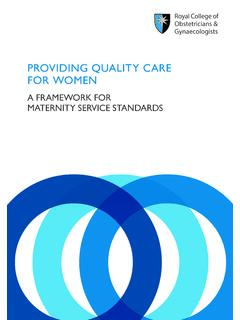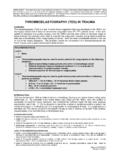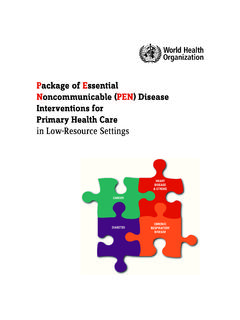Transcription of The Role of Recovery Support Services in Recovery-Oriented ...
1 The Role of Recovery Support Services in Recovery -Oriented Systems of CareWhite Department of HealtH anD HUman ServiceSSubstance Abuse and Mental Health Services AdministrationCenter for Substance Abuse Treatment document was written by Linda Kaplan, Special Expert, Substance Abuse and Mental Health Services Administration (SAMHSA), Department of Health and Human Services (HHS). Leadership was provided by H. Westley Clark, , , , Director, Center for Substance Abuse Treatment, CSAT/SAMHSA; Jack B. Stein, LCSW, , Director, Division of Services Improvement, CSAT/SAMHSA; and George Gilbert, Director, Office of Program Analysis and Coordination, CSAT/SAMHSA. In addition, SAMHSA staff Cathy Nugent, Marsha Baker, Shannon Taitt, and Ruby Neville provided significant contributions to this views, opinions, and content of this publication are those of the author and do not necessarily reflect the views, opinions, or policies of SAMHSA or HHS.
2 Public Domain noticeAll material appearing in this report is in the public domain and may be reproduced or copied without permission from SAMHSA. Citation of the source is appreciated. However, this publication may not be reproduced or distributed for a fee without the specific, written authorization of the Office of Communications, SAMHSA, access and copies of publicationThis publication may be accessed electronically through the following Internet World Wide Web connection: For additional free copies of this document, please call SAMHSA s Health Information Network at 1-877-SAMHSA-7 (1-877-726-4727) or 1-800-487-4889 (TDD).recommended citationKaplan, L., The Role of Recovery Support Services in Recovery -Oriented Systems of care . DHHS Publication No. (SMA) 08-4315. Rockville, MD: Center for Substance Abuse Treatment, Substance Abuse and Mental Health Services Administration, OfficeDivision of Services Improvement, Center for Substance Abuse Treatment, Substance Abuse and Mental Health Services Administration, 1 Choke Cherry Road, Rockville, MD 20857.
3 DHHS Publication No. (SMA) 08-4315 Printed 2008 The Role of Recovery Support Services in Recovery -Oriented Systems of CareWhite PaperThe Role of Recovery Support Services in Recovery -Oriented Systems of CareWhite Paper1 IntroductionAddiction has long been recognized as a chronic disease. However, most treatment for ad-diction uses acute care interventions rather than a disease management approach. For many people seeking Recovery , this has created a revolving door of multiple acute treatment epi-sodes. Under the leadership of the Substance Abuse and Mental Health Services Administra-tion (SAMHSA), Center for Substance Abuse Treatment (CSAT), the substance use disorders treatment field is shifting from an acute care model of treatment to a chronic care approach, known as Recovery -oriented systems of care . Creating Recovery -oriented systems of care requires a transformation of the entire service system as it shifts to becoming responsive to meet the needs of individuals and families seek-ing Services .
4 To be effective, Recovery -oriented systems must infuse the language, culture, and spirit of Recovery throughout their systems of care . They have to develop values and principles that are shaped by individuals and families in Recovery . These values and prin-ciples provide the foundation for systems that provide: Accessible Services that engage and retain people seeking Recovery ; zA continuum of Services rather than crisis-oriented care ; zCare that is age-and gender-appropriate and culturally competent; and zWhere possible, care in the person s community and home using natural z This movement to Recovery -oriented systems of care is being informed by a number of key dynamics that are affecting the substance use disorders field simultaneously, including:SAMHSA s commitment to ensuring a person-centered approach to Recovery z that offers clear choices to individuals;Increased involvement of grassroots faith-and community-based organizations z that afford people multiple pathways to Recovery .
5 Current research findings supporting the need for comprehensive, individualized z Services ;Changing norms and expectations of Services as defined by the Institute of z Medicine s Quality Chasm Series reports;Transformation in the mental health field with its focus on consumer-driven z Recovery -oriented Services ;An emerging and energized Recovery community; zKey leadership on the State level ( , Connecticut and Arizona each have z created Recovery -oriented systems for behavioral health Services ); andMost importantly, SAMHSA s commitment to providing a life in the community z for everyone. 1 Supports that occur and are provided by the relationships in the community work/school, social and PaperThe Role of Recovery Support Services in Recovery -Oriented Systems of Care2 Recovery Support Services Services provided to people and families during the initiation, on-going, and post-acute stages of their Recovery are an integral component of Recovery -oriented systems of care .
6 A variety of programs and providers provide these Services in many venues. II. PurposeThe purpose of this White Paper is twofold: (1) to describe our understanding of the present state of Recovery Support Services ; and (2) to lay a framework for future activities and products that will Support the continuing development of Recovery Support Services . III. BackgroundA. Institute of Medicine The Institute of Medicine (IOM) issued two seminal reports Crossing the Quality Chasm (2001) and Improving the Quality of Health care for Mental and Substance-Use Conditions (2006) that inform the foundational qualities of Recovery -oriented systems of care . IOM proposed six goals to improving the health care system (2001). Health care should be:Safe avoiding injuries to patients; zEffective providing Services based on science; zPatient-centered providing respectful and responsive care ; zTimely reducing waiting and delays for service; zEfficient avoiding waste; and zEquitable providing equal care to all people without regard to gender, z ethnicity, geography, socioeconomic status, or any other concluded that quality health care should employ a patient-centered approach that in-cludes participation of patients and their families in the decision-making and in all aspects of treatment and Recovery planning and management.
7 IOM also maintains that patients self- management of their own Recovery is central to improving the quality of care . In addition, the 2006 IOM report on mental and substance-use conditions recognizes the importance of peer Support Services and calls for reimbursement for peer Support Services and other Recovery Support Research Supporting Recovery Support ServicesAddiction treatment and Recovery Support Services have repeatedly been shown to be effective with many people achieving Recovery . As with any chronic disease, however, discrete treatment episodes, supported by continuing Recovery Support Services , are often needed to help people achieve and maintain Recovery . Treatment for addictive disorders is not typically a one-shot type of intervention. Research indicates that cost savings are associated with a chronic care model when compared to an acute care model (Zarkin, Bray, Mitra, Cisler, & Kivlahan, 2005).
8 The Role of Recovery Support Services in Recovery -Oriented Systems of CareWhite Paper32 Recovery capital means the quantity and quality of internal and external resources an individual brings to the initiation and maintenance of Recovery (Granfield & Cloud, 1999).A number of studies have been conducted on specific aspects of Recovery Support Services . Several studies indicate that for people with low Recovery capital2 and high disease severity, social supports provided by sober living communities are critically important to long-term Recovery (Jason, Davis, Ferrari, & Bishop, 2001; Jason, Davis, & Ferrari, 2007). Other stud-ies on Recovery Support Services involving family members and other allies found that pro-viding social supports helps maintain Recovery (Gruber & Fleetwood, 2004; Brown & Lewis, 1998). Studies have also shown that providing comprehensive Services assists Recovery (Prin-gle et al.)
9 , 2002) and that strong social supports also improve Recovery outcomes (Humphreys, Moos, & Finney, 1995). Research on peer- Recovery Support , in addition to the many studies that have been conducted on mutual aid groups, provides evidence for the effectiveness of Services in supporting Recovery (Humphreys et al., 2004). Another study randomly assigned 150 individuals to either an Oxford House or usual- care conditions after substance abuse treatment. At 24-month follow-up, those in the Oxford House condition had significantly lower substance use, significantly higher monthly income, and significantly lower incarcera-tion rates that did those in the usual- care condition (Jason, Olson, Ferrari, & Lo Sasso, 2006). Additional studies Support the benefit of Recovery coaches, mutual aid societies, and social and community supports in achieving long-term Recovery (Scott, Dennis, & Foss, 2005; Laudet, Savage, & Mahmood, 2002).
10 A study by McKay (2005) found that Recovery check-ups and active linkage to Recovery supports following treatment are important in maintaining Recovery . These Services can be low cost, such as telephone-based Support and checkups, and still be effective. Research by Fiorentine and Hillhouse (2000) found that those who participated in both treatment and Recovery Support groups had better long-term Recovery outcomes than people who used either service SAMHSA s ProgramsSAMHSA/CSAT has initiated several grant programs that foster the creation of a chronic care approach for persons with substance use disorders, which can be integral to the develop-ment of Recovery -oriented systems of care . SAMHSA s Access to Recovery and the Recovery Community Services Program are the most illustrative examples. These programs Support SAMHSA s goals of accountability, capacity, and effectiveness as well as the six aims ex-pounded by the Institute of Medicine by fostering person-centered care , providing choice, expanding capacity, and improving linkages to primary care and community- and faith-based organizations.






